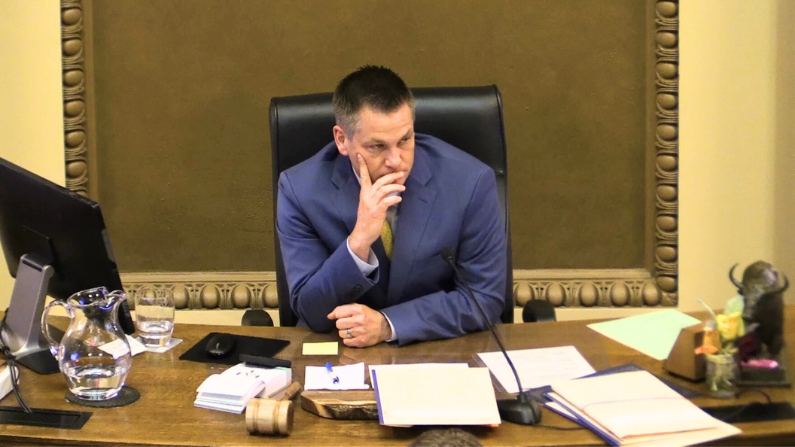Leaders of the Wyoming Senate announced that they wouldn’t pass the supplemental budget bill in an after-work-hours statement on Feb. 26.
That might mean one of the legislative session’s biggest bills is dead.
Several senators told Wyoming Public Radio in interviews that this is the first time in recent memory that the chamber has declined to pass a supplemental, which is ordinarily meant for unexpected fiscal circumstances in years between budget sessions and is traditionally proposed by the governor.
“As a Democrat, while I understand their issues, there’s a few things that I’m really gonna miss out of that budget,” said Minority Floor Leader Sen. Mike Gierau (D-Jackson) in the lobby of the Senate. “I’m disappointed, I am. I won’t lie to you.”
That disappointment comes, in part, from provisions in the supplemental that would’ve given tax relief for seniors, additional funding to preschools for kids with developmental disabilities and replenished the state’s wildfire restoration account.
Lawmakers like Gierau now need to look for existing bills to serve as new homes for those policies, he said. He added that he’d had a chance to “make his case” about the supplemental to Senate leadership. Other senators, like Larry Hicks (R-Baggs), said they learned about the news after the fact. In Hicks’ case, he said he found out from reading a story in Cowboy State Daily.
But Gierau and others’ concern is that not everything in the supplemental will be saved. Appropriations that ordinarily would’ve been in the supplemental budget can only be attached to other bills if they’re germane to the individual issues those measures seek to address.
“Yes, that’s true [some appropriations might die],” said Majority Floor Leader Sen. Tara Nethercott (R-Cheyenne). “I think that those things could have died anyway on [the Joint] Conference Committee or continuing to work it out.”
She drew a parallel between what the Senate has opted to do with the supplemental and what the Trump administration is doing in terms of reductions to the size of the federal government.
“I feel like we rightsized the state budget [in a way that wasn’t] inconsistent with what the federal government is doing, but [was] really a solid assessment of what our supplemental budget did, and how we could accomplish its primary purposes without overspending,” Nethercott said.
Prior to leadership’s announcement, House and Senate versions of the supplemental budget were over $100 million apart, with the Wyoming Freedom Caucus-led Joint Appropriations Committee voting to reduce or strike many of the funding requests Gov. Mark Gordon made. Several of those requests were later restored by the Senate side of the committee.
In the House, some representatives said they’re also not pleased with the Senate’s direction.

Rep. Tony Locke (R-Casper) talked to Wyoming Public Radio about the Senate developments. (Jordan Uplinger / Wyoming Public Media)
“[I’m] very disappointed that the budget is going to die,” said Rep. Tony Locke (R-Casper). “That’s disappointing. We had some important stuff in there. We tried to cut the budget as much as we could, but at the end of the day, it dying obviously cuts things that I think were probably important.”
Rep. Lloyd Larsen (R-Lander), a veteran legislator in the House, concurred with Locke.
“I think that there’s components of the supplemental budget that, if we don’t somehow address them, will really have a negative impact on the state, providers in the state, people in the state, the citizens of the state,” said Larsen. “Our job for the next couple of days on both sides is: Is there a vehicle available that we can maybe take some of those really critical pieces from the budget and still move forward, knowing that the large majority won’t?”
For example, Larsen said he inserted one of his policy priorities to fund medical education and training originally found in the supplemental budget into a third reading amendment to Sen. Cheri Steinmetz’s bill banning diversity, equity and inclusion initiatives.
“The Senate would have to concur,” he said. “Look, having been here a year or two, you kind of know where to look, and you think of ways to do it. Sometimes it’s not the prettiest thing. It’s like putting lipstick on a sow. It still doesn’t look very attractive, but if we can get it across the finish line and keep some of these really critical things moving forward, I think we have a responsibility to try.”
The day after the Senate opted out of passing the supplemental, Gordon issued a press release decrying the choice, writing, “This legislature has overlooked emergencies and ignored unanticipated expenses in a quest for political talking points. This is what occurs in a ‘no compromise’ environment.”
The supplemental budget could still technically be revived at any point between now and the end of the session on March 6.
This reporting was made possible by a grant from the Corporation For Public Broadcasting, supporting state government coverage in the state. Wyoming Public Media and Jackson Hole Community Radio are partnering to cover state issues both on air and online.






